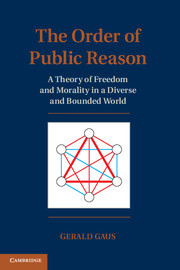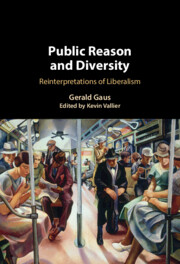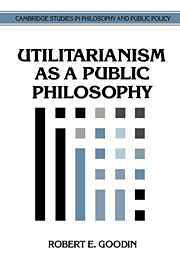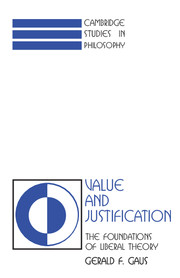The Order of Public Reason
A Theory of Freedom and Morality in a Diverse and Bounded World
£37.99
- Author: Gerald Gaus, University of Arizona
- Date Published: September 2012
- availability: Available
- format: Paperback
- isbn: 9781107668058
£
37.99
Paperback
Other available formats:
Hardback, eBook
Looking for an inspection copy?
This title is not currently available on inspection
-
In this innovative and important work, Gerald Gaus advances a revised and more realistic account of public reason liberalism, showing how, in the midst of fundamental disagreement about values and moral beliefs, we can achieve a moral and political order that treats all as free and equal moral persons. The first part of this work analyzes social morality as a system of authoritative moral rules. Drawing on an earlier generation of moral philosophers such as Kurt Baier and Peter Strawson as well as current work in the social sciences, Gaus argues that our social morality is an evolved social fact, which is the necessary foundation of a mutually beneficial social order. The second part considers how this system of social moral authority can be justified to all moral persons. Drawing on the tools of game theory, social choice theory, experimental psychology and evolutionary theory, Gaus shows how a free society can secure a moral equilibrium that is endorsed by all, and how a just state respects, and develops, such an equilibrium.
Read more- At the cutting edge of work in 'public reason'
- Draws extensively on work in the social sciences to shed light on philosophical problems
- Argues for a re-evaluation of the task of moral philosophy, arguing that it is not about legislating the ideal morality, but rather testing the acceptability of the morality of particular societies - an anti-Utopian conception of moral theory
Reviews & endorsements
'The Order of Public Reason is one of the most ambitious and accomplished works in moral philosophy of the first decade of the new century. Gaus's command of the relevant literature in philosophy, economics, psychology, and elsewhere is daunting, and his ability to orchestrate a sustained argument leading from foundational postulates of the logic of practical reason to prescriptions for effective politics is altogether masterful.' Loren Lomasky, University of Virginia
See more reviews'Gerald Gaus has written a refreshingly ambitious book that is both analytically rigorous and conscientiously engaged with the history of political philosophy. Drawing upon considerations from economics, psychology, evolutionary theory, social epistemology, and meta-ethics, Gaus advances an original view of the moral principles that provide the groundwork for a liberal society. He then endeavors to show that these basic principles can be justified to all, despite the enduring moral disagreements that are inevitable among free persons. Tightly argued and elegantly written, The Order of Public Reason will launch a new round of debates over liberalism. Readers will find ample occasion for disagreement with Gaus, but no one will emerge from these pages without having learned a great deal. With this book, Gerald Gaus makes a profound contribution not only to political theory, but to philosophy as such.' Robert Talisse, Vanderbilt University
'Much of the best contemporary work in moral theory falls in two hitherto separate camps, a Kantian camp that seeks to derive a universal morality via rational deliberation and a Humean camp that seeks to account for moral norms as the product of cultural evolution. In The Order of Public Reason, Gerald Gaus argues forcefully that moral philosophers need to draw inspiration from both Hume and Kant. Gaus integrates large parts of the recent rational deliberation and evolutionary traditions in ethics, demonstrating that one can both explain social morality as an evolved equilibrium and justify this equilibrium as a system of norms a community of free and equal persons can endorse … a pioneering study that incorporates an extraordinary range of works of moral philosophers … together with the most important relevant tools from the social sciences.' Peter Vanderschraaf, University of California, Merced
'Gaus's book is highly complex and stimulating, covering a daunting range of topics. It provides, I believe, the most complete and rigorous defense of classical liberalism available to date, and will certainly spark an industry of debate, elaboration, and discussion. It deserves to do so. I have been able to touch on only a small number of the interesting topics in the book … I learned from nearly every page. It would be an excellent book to anchor a graduate seminar in moral or political philosophy.' Notre Dame Philosophical Reviews
'At the risk of cliché, it is impossible within the confines of this review to do justice to Gaus' magesterial offering. With typical insight, eloquence and accessibility, Gaus innovatively and productively engages one of the most fundamental and difficult dilemmas confronting contemporary philosophers and societies. The Order of Public Reason is a brilliant treatise that will surely serve as a fundamental resource for all serious future debate and scholarship concerning the idea and practice of social morality. Shaun P. Young, Political Studies Review
'The Order of Public Reason is a voluminous but also extremely rich book, worth reading for anyone working in moral and political philosophy. It deserves to become a classic reference work of public reason liberalism.' Fabian Wendt, Utilitas
'Gerald Gaus' The Order of Public Reason: A Theory of Freedom and Morality in a Diverse and Bounded World is a big book in its title and its length and much more importantly in its intellectual ambition, breadth, complexity, and power. Gaus draws upon an extensive knowledge of recent and not so recent moral and political philosophy, game theory, moral psychology, experimental economics, experimental philosophy, and evolutionary theory.' Criminal Law and Philosophy
Customer reviews
Not yet reviewed
Be the first to review
Review was not posted due to profanity
×Product details
- Date Published: September 2012
- format: Paperback
- isbn: 9781107668058
- length: 644 pages
- dimensions: 223 x 152 x 32 mm
- weight: 0.85kg
- contains: 53 b/w illus.
- availability: Available
Table of Contents
1. The fundamental problem
Part I. Social Order and Social Morality:
2. The failure of instrumentalism
3. Social morality as the sphere of rules
4. Emotion and reason in social morality
Part II. Real Public Reason:
5. The justificatory problem and the deliberative model
6. The rights of the moderns
7. Moral equilibrium and moral freedom
8. The moral and political orders
Appendix A: the plurality of morality
Appendix B: Mozick's attempt to solve the prisoner's dilemma
Appendix C: deontic utility functions
Appendix D: the Kantian coordination game
Appendix E: protection of property rights and economic freedom in states that do best at protecting civil rights.
Sorry, this resource is locked
Please register or sign in to request access. If you are having problems accessing these resources please email [email protected]
Register Sign in» Proceed
You are now leaving the Cambridge University Press website. Your eBook purchase and download will be completed by our partner www.ebooks.com. Please see the permission section of the www.ebooks.com catalogue page for details of the print & copy limits on our eBooks.
Continue ×Are you sure you want to delete your account?
This cannot be undone.
Thank you for your feedback which will help us improve our service.
If you requested a response, we will make sure to get back to you shortly.
×




